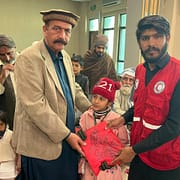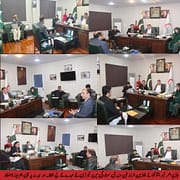Inclusion in Action: PRCS Commemorates the International Day of Persons with Disabilities
On December 3, 2025, the Pakistan Red Crescent Society (PRCS), with the valued support of the Norwegian Red Cross, commemorated the International Day of Persons with Disabilities through two impactful and inclusive events held in Dera Ismail Khan and Tank districts. The activities reflected PRCS’s strong commitment to promoting inclusion, dignity, equality, and empowerment for persons with disabilities across Khyber Pakhtunkhwa.
Celebrating Ability and Talent in D.I. Khan
In D.I. Khan, more than 50 persons with disabilities actively participated in a vibrant program featuring sports and arts activities, including cricket matches, wheelchair races, and poetry sessions. These activities provided participants with an opportunity to showcase their talents, build confidence, and foster teamwork in an encouraging and inclusive environment.
To further support and empower participants, essential assistive and educational items were distributed, including wheelchairs, school uniforms, trophies, and medals. The initiative aimed not only to meet immediate needs but also to recognize the abilities and potential of persons with disabilities, reinforcing their role as active and valued members of society.
Awareness and Advocacy in Tank
In Tank, an awareness-focused event brought together teachers, students, key stakeholders, and eight specially invited persons with disabilities. The session highlighted the importance of accessibility, social inclusion, and equal opportunities, while encouraging collective responsibility toward supporting persons with disabilities.
During the event, support packages and commemorative shields were distributed. Stakeholders also pledged continued assistance, including support for disability registration, improved access to services, and sustained advocacy efforts to ensure a more inclusive community environment.
A Commitment to Inclusion and Dignity
Through these meaningful initiatives, PRCS reaffirmed its dedication to inclusive humanitarian action, ensuring that no one is left behind. The observance of the International Day of Persons with Disabilities served as a powerful reminder that empowerment begins with recognition, participation, and equal access to opportunities.
PRCS remains committed to working with partners, communities, and stakeholders to promote inclusion, resilience, and dignity for all, especially the most vulnerable segments of society.















